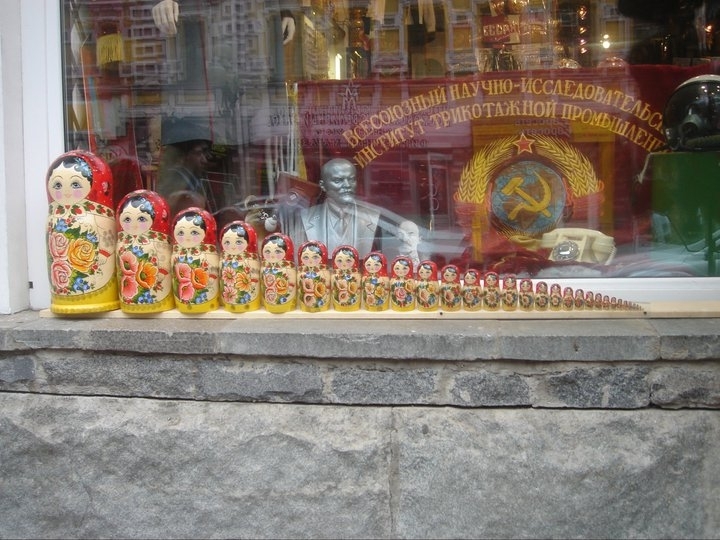 Born in 1973 in Ivano-Frankovsk, Ukraine, Mikhail Elizarov could barely remember the Soviet era of his parents’ and grandparents’ generation. In 2007, however, the young writer wrote a book that would come to be associated with the lost generation of Soviet people and won the 2008 Russian Booker Prize. It was the fourth and biggest book of the bright debutant of the 90s and, in essence, the first major post-Soviet novel showing the reaction of the generation of the 30s to the world in which they lived.
Born in 1973 in Ivano-Frankovsk, Ukraine, Mikhail Elizarov could barely remember the Soviet era of his parents’ and grandparents’ generation. In 2007, however, the young writer wrote a book that would come to be associated with the lost generation of Soviet people and won the 2008 Russian Booker Prize. It was the fourth and biggest book of the bright debutant of the 90s and, in essence, the first major post-Soviet novel showing the reaction of the generation of the 30s to the world in which they lived.
The title of the book, Библиотекарь (The Librarian), deceptively conjures up the expectation of perhaps a quiet evening’s reading. Indeed, The Librarian is a novel about books, about the mystical powers of the written word. At the beginning, one hardly expects the strange upheavals that such books can cause, including the violent refusal of the books’ readers to acknowledge the end of the era by the obscure writer Gromov, and an almost Kafkaesque ending to the book. Gromov’s books had deceptive titles like Fly Happiness or Silver-Flat Waters, but in fact they had the magical power to change the person who read them, and readers began to organize “libraries” or armies to fight for these books. Alexei inherits a The Book of Memory and becomes a “Librarian” without knowing it. Gromov’s books gave different powers to readers; Narva, known as the Book of Joy, has a euphoric effect, and Книга Ярости (The Book of Rage) stimulates anger. But the most important prize in the battle between the libraries is the lost Book of the Meaning. We understand that it is Gromov’s eulogy to Stalin.
The Librarian starts with a quotation from The Foundation Pit by Andrei Platonov. And in a way, Elizarov’s book is a continuation of the ideas of Platonov’s great and tragic book about wasted lives:
“The worker must fully understand that baskets and engines can be made as necessary, but it’s not possible to simply make a song or a sense of excitement. The song is more valuable than mere things…”
Andrei Platonov
Gromov
“The writer Dmitry Alexandrovich Gromov (1910-1981) lived his final days in complete obscurity. His books completely disappeared in the debris of Lethe, and when political disasters destroyed the Soviet motherland, it appeared as though there was nobody left to remember Gromov.
Hardly anyone read Gromov. Of course, the editors who determined the political loyalty of the texts and the critics read it. But it was unlikely for somebody to be worried about and interested in titles like “Proletarian” (1951), “Fly, Happiness!” (1954), “Narva” (1965), “On the Roads of Labor” (1968), “The Silver Flat-Water” (1972), or “The Calm Grass” (197).7).
The biography of Gromov went side by side with the development of the socialist fatherland. He finished middle school and pedagogical college and worked as executive secretary in the factory newspaper’s editorial board. The purges and the repression did not touch Gromov; he quietly endured until June of ‘41 before he was mobilized. He came as a military journalist to the front. In the winter of 1943 Gromov ‘s hands were frostbitten; the left wrist was saved but the right was amputated.
Thus, all of Gromov’s books were created by a forced left-handed man. After the victory, Gromov moved his family from the Tashkent evacuation to Donbass and worked in the editorial office of the city newspaper until his retirement.
Gromov started to write late, as a mature forty-year-old man. He often addressed the theme of the formation of the country, glorified the cotton being of the provincial cities, towns and villages, wrote about mines, factories, the boundless Virgin Soil and harvest battles. The heroes of his books were usually the Chairmen of the Kolkhozes, red directors, soldiers returning from the front, the widows keeping their love and civil courage, the pioneers and Komsomol members – strong, cheerful, and ready for heroic labor. Good triumphed with painful regularity: the metallurgic factories were built in record time, the recent student during his sixth month internship at the factory became a skilled specialist, the plant exceeded the plan and accepted the new one, and the grain in the fall flowed by the golden mountains to the Kolkhoz’s granaries. Evil was rehabilitated or went to prison.”
* * * *
“Although Gromov published more than half a million copies of his books, only a few copies survived in club libraries in distant villages, hospitals, ITKs, orphanages, or otherwise rotting in basements among party congress materials and serials of Lenin’s collected works.
And yet Gromov had devoted fans. They scoured the country for surviving books and would do anything for them. In normal life, Gromov’s books had titles about some shallow waters and grasses. However, Gromov’s collectors used significantly different titles – “The Book of Power”, “The Book of Strength”, “The Book of Rage”, “The Book of Patience”, “The Book of Joy”, “The Book of Memory”, “The Book of Meaning”…
By Mikhail Elizarov
Moscow: Ad Marginem, 2010.
Translated by Elena Dimov, edited by Margarita Dimova
Disclaimer
Translations of the excerpts from the works by the contemporary writers are used in educational purposes for students of modern Russian literature or for literary criticism only.
